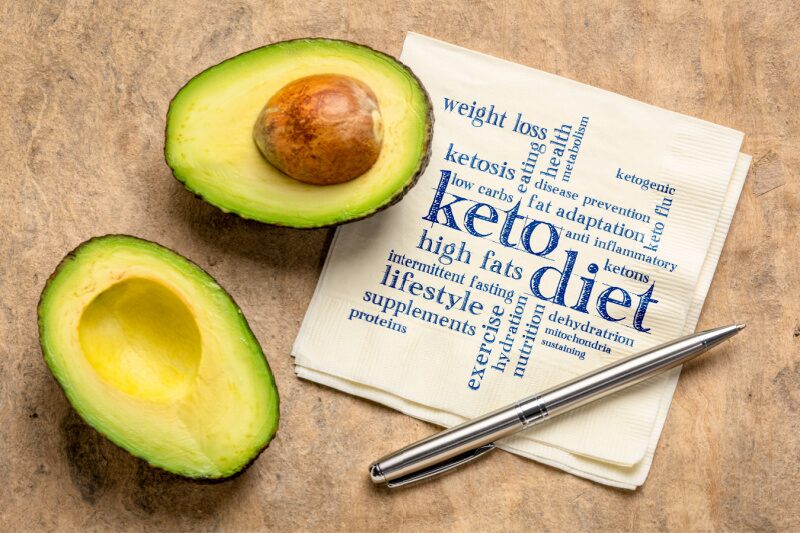Keto, or the ketogenic diet, is one of the many prevalent eating plans to manage weight. This diet pattern involves cutting your carbs to just 50 grams a day, which can help your body reach the state of ketosis. In this state, your body burns fat, not sugar, to maintain your body functions. However, consuming a keto diet for a long time can have several undesirable effects.
What you need to know:
- An overview of the keto diet
- Common keto diet side effects
- Managing and minimizing Keto diet side effects
- Who should avoid the keto diet?
- Longterm concerns: Exploring potential risks of extended keto dieting
An overview of the keto diet
 The keto diet comprises a protein-rich diet mixed with low carbohydrates. This diet has been used to manage diabetes since the 1920s. In the recent times, it has been gaining traction as a weight-management strategy as it contains very few carbohydrates.
The keto diet comprises a protein-rich diet mixed with low carbohydrates. This diet has been used to manage diabetes since the 1920s. In the recent times, it has been gaining traction as a weight-management strategy as it contains very few carbohydrates.
In addition, it also benefits people with epilepsy. However, it contains a lot of fat, and consuming it daily can cause keto diet side effects, like ketoacidosis. Keto diet side effects generally appear when you start consuming it for the first time.
Common keto diet side effects
Here are some of the most common keto diet side effects that you can experience while following it:
Keto Flu
Keto flu contains many medical symptoms that generally occur when you experience ketosis for the first few times. But it also resolves soon on its own. The symptoms include:
- Unstable sleep cycle
- Confusion and dizziness
- Nausea
- Increased tiredness
- Decreased metabolic function
Digestive Issues
Sudden diet changes can cause digestive problems in some individuals. If you are just starting the keto diet, expect constipation and other side effects. Consuming more water and fiber helps to deal with digestive issues.
Nutrient Deficiencies
A keto diet doesn’t contain many fruits and veggies, which otherwise would have yielded a high-carbohydrate intake. However, a diet without fruits and veggies can lower your intake of the following nutrients:
- Calcium
- Potassium
- Magnesium
- Fibers
- Vitamin C
- Vitamin-A
Not helpful for heart health-
Keto diets are high-fat diets that do not limit saturated fat intake. According to the American Heart Association, this practice does not align well with heart-healthy eating guidelines.
Bad Breath
You can also experience bad breath, which smells fruity and slightly sweet, or have a metallic taste in the mouth. Acetone is a byproduct of the metallic system, which is often exhaled through our mouths. Sweat and urine can also smell like acetone. For most people, though, this symptom goes away on its own.
Managing and minimizing keto diet side effects
 Here are some of the tips for managing and minimizing keto side effects:
Here are some of the tips for managing and minimizing keto side effects:
- Stay hydrated: Consider having at least 2 liters of water every day. Water can help you manage weight while on the keto diet.
- Get enough salt in your diet: You sweat and lose sodium when your carb input is less. Hence, consult your doctor, and add salt to your diet.
- Don’t overexercise: For the first two weeks of the keto diet, consider sticking to moderate exercise intensity.
Who should avoid the keto diet?
People with the following health conditions should avoid the keto diet.
- Liver failure
- Thyroid problems
- Hypoglycemic conditions
- Gallbladder disease
Combatting bad breath on keto
Here’s how you can combat bad breath that comes along with the keto diet:
- Drink more water to pee more, which removes the smelly ketones and cleans your mouth.
- Brush your teeth to eliminate food bits in your mouth that can stink, and use the fresh smell of toothpaste to hide bad breath from the keto diet.
- Mints or chewing gum can mask bad breath and make your mouth less dry, which prevents bad-smelling bacteria from growing.
Longterm concerns: Exploring potential risks of extended keto dieting
Here are some long-term complications of eating a keto diet for a long time:
- High protein intake, as in a ketogenic diet, could exacerbate kidney issues for those with existing kidney conditions.
- Individuals with type-1 diabetes may experience worsened insulin resistance and additional complications from prolonged ketosis.
- A ketogenic diet might cause a quick rise in overall cholesterol levels, including the harmful low-density lipoprotein cholesterol, increasing the risk of heart disease.
Consider checking in with your doctor if you want to start a keto diet.
Stay tuned to the Activ Living Community. Keep up to date with the latest health tips and trends through expert videos, podcasts, articles, and much more in nutrition, fitness, mindfulness, and lifestyle conditions like Asthma, Blood Pressure, Cholesterol, and Diabetes. Activ Living ke saath sahi sehat ki shuruaat ABHIkaro.
You may also be interested in the following blogs:
- The Ultimate Guide To A High Protein Low Carb Diet For Weight Loss
- Intermittent Fasting Vs Keto Vs Vegan Diets Explained
Popular Searches
How to lower blood pressure | Fruits good for liver | Unhealthy foods | Ragi Benefits | Basal Metabolic Rate | Acupressure points for High Blood Pressure | Ayurvedic medicine for blood pressure | How to control cholesterol at home | Homeopathy for Asthma | Biological Age | Home remedies for TB | Natural beta blockers | Negative effects of internet | Types of walking | Blood pressure calculator | Blood sugar calculator | BMI Calculator





 1800-270-7000
1800-270-7000








